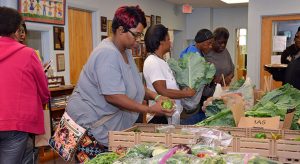New program goes to fight food insecurity in Illinois
June 9, 2022
The establishment of this program builds on efforts to increase access to healthy food in the state. These efforts include public-private partnerships to expand purchasing options for those who receive SNAP benefits. (Photo courtesy of University of Illinois Extension )
The state has established the Healthy Foods Access Program, to provide equitable access to healthy food in every corner of the state.
“All Illinoisans deserve access to healthy foods,” said Gov. J.B. Pritzker on June 9 when signing the legislation. “Especially throughout the pandemic, food insecurity has been a major concern in our underserved communities. It has always been my administration’s mission to ensure that no child, no family, no elder goes without the food they need to stay nourished and healthy. That’s why I am proud to sign this bill into law to bolster the health and wellbeing of our residents while transforming food deserts into food oases.”
In addressing the signing of the legislation, State Rep. Jehan Gordon-Booth (D-Peoria), said, “There are too many neighborhoods across our state where people do not have access to fresh, healthy food. Let’s take advantage of our nutritional, locally-sourced food and spur connections with communities that have been left behind. Healthy food can have immense benefits for an individual, but we have to make sure it’s easily available.”
House Bill 2382 enables the Department of Human Services in coordination with the Department of Commerce and Economic Opportunity (DCEO) to establish the Healthy Food Development Program to expand access to healthy foods in underserved areas. Grocery stores, corner stores, farmers’ markets, and other small retailers may receive assistance through grants, loans, equipment, or other financial assistance to be awarded on a competitive basis.
This legislation is effective Jan.1, 2023.
While the exact program design has not yet been established, to implement the program, DCEO and DHS may partner with non-profit organizations on implementation and DHS will designate a grocery ambassador to assist the state’s healthy food retailers by providing research and data on eligible areas with insufficient grocery access. Through this ambassador, small grocery retailers in the state will be provided technical assistance and support.
The establishment of this program builds on efforts to increase access to healthy food in the state. These efforts include public-private partnerships to expand purchasing options for those who receive SNAP benefits, empowering the Illinois Commission to End Hunger to advance the From Food Insecurity to Food Equity: A Roadmap to End Hunger plan, a three-part strategy for connecting residents in need to nutrition assistance programs, and promoting equitable access to food for every Illinoisan.
In Cook County alone, one in six children experience food insecurity on any given day. Statewide, 17 percent of children live in poverty. Federal programs, such as SNAP, School Breakfast and summer meal programs, are widely underutilized. Prior to the coronavirus pandemic, 1.6 million Illinoisans were participating in SNAP.
During the initial months of the pandemic, SNAP applications soared to over 35,000 applications a week, up from an average of 9,000 weekly. In April 0f 2020, food insecurity doubled in the population overall and tripled for Illinois households with kids. In addition, Illinois has seen a 60 percent increase in food insecurity for older adults during the pandemic.







